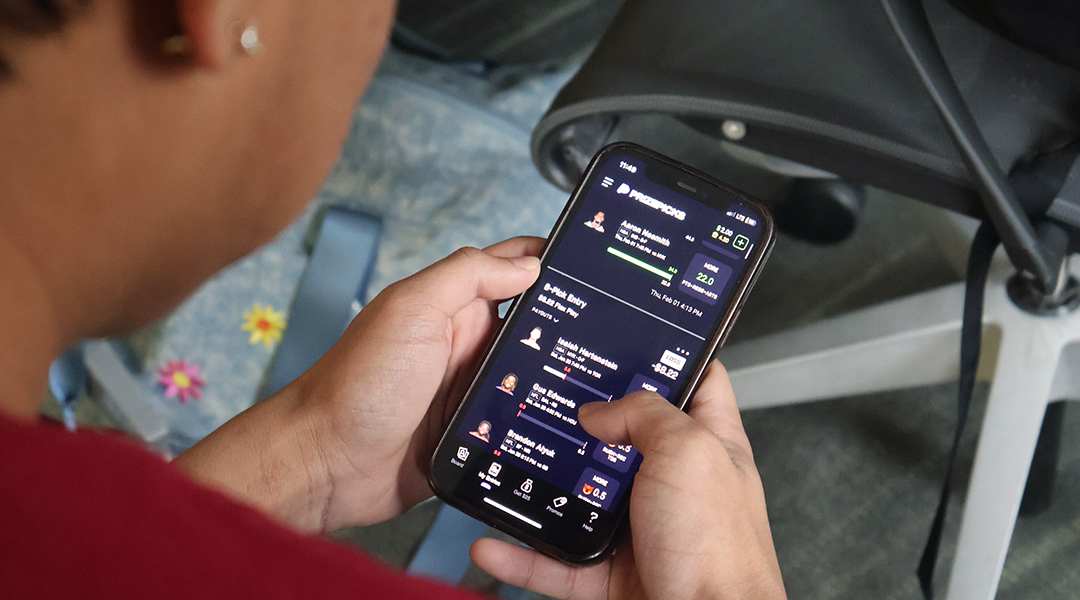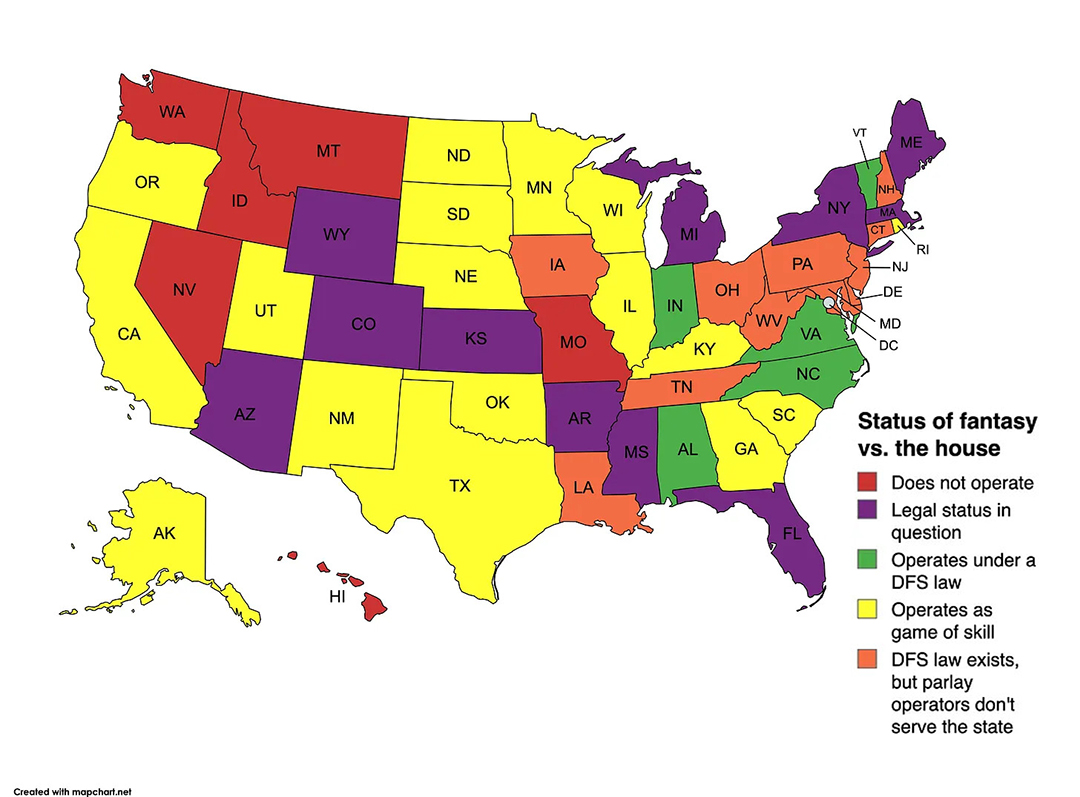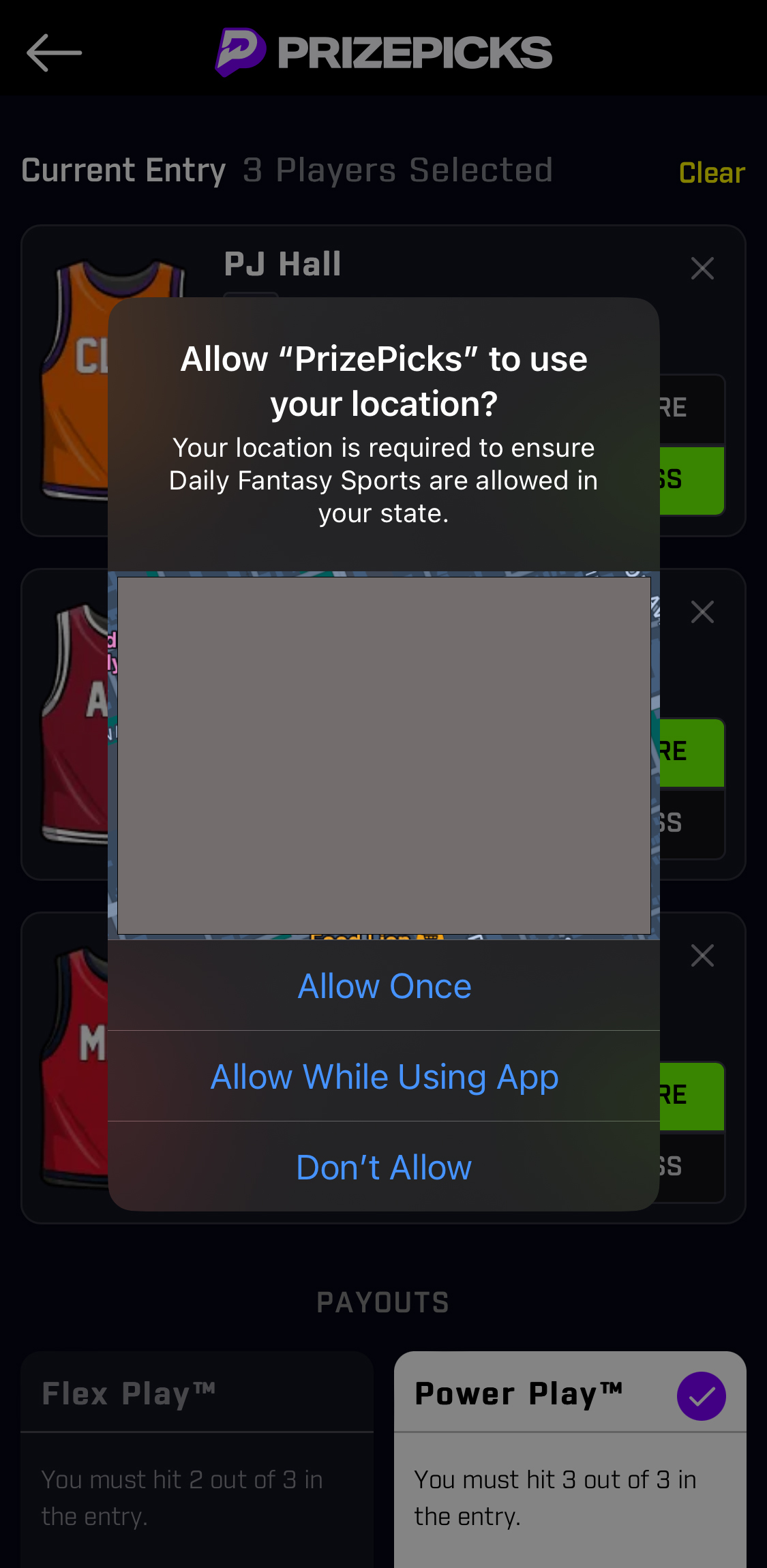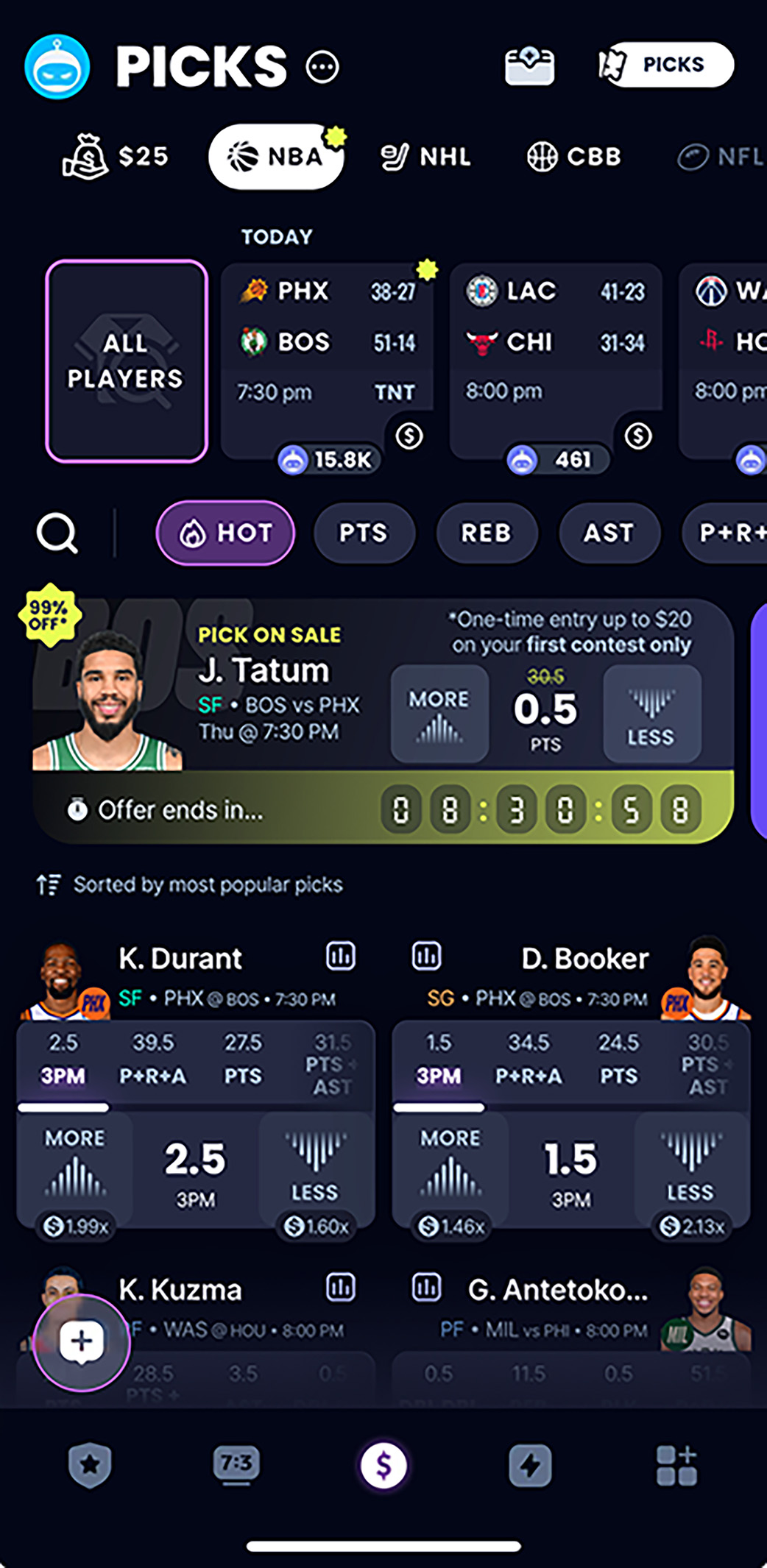Daily fantasy betting allows users to make several bets at a time on any combination of players’ performances and in various sports. (Photo illustration by Stephen Enright/Carolina News and Reporter)
While gambling in South Carolina is illegal – sort of – the reality is that betting on sports isn’t difficult in the Palmetto State.
Some states recently demanded online betting sites shut down in their state, saying companies are making bogus claims that their contests are not gambling.
The question now becomes whether South Carolina could follow suit.
The state is one of several with laws expressly prohibiting gambling on sports teams. What’s legal nationwide because of federal law are wagers called fantasy sports, which involve groups of people assembling imaginary teams of real players, then seeing how those “teams” perform in real life. Bettors are wagering on multiple players’ individual performances, not games.
But some sites now offer what’s called “daily fantasy sports.” Bettors still wager on players’ statistics – but over a short time, usually a day. And bettors often compete not against other bettors but against the sportsbook, or “the house,” meaning they’re betting against faceless gaming experts or computer algorithms.
Those two things – the short-term nature of the bets and competing against the house – have begun to blur the line between “fantasy” betting and the sports gambling that’s illegal. They reflect Las Vegas more than that game against your brothers and cousins.
“These games, logistically and mechanically, are exactly the same as sportsbooks,” said Dustin Gouker, a sports betting and online gambling consultant and analyst at Closing Line Consulting in Oregon.
But now, the ground has begun to shift around South Carolina.
Florida is one of the most recent states to send cease-and-desist letters in recent weeks to sites that offer daily fantasy, telling them they were in violation of gambling laws.
Florida joined Massachusetts, Arkansas, Kansas and New York, none of which allow sports gambling outside of tribal casinos, in writing letters.
Robert Kittle, a spokesperson for the S.C. attorney general, declined an interview request.
But he said, “Our office is not taking action on online gambling.”
Meanwhile, South Carolinians have a new, full-on sports gambling option: North Carolina on March 11 legalized all sports gambling.
“I think one of the things that’s going to happen in South Carolina is, more and more, South Carolina citizens are going to go to North Carolina to engage in a more open sport gambling marketplace,” said Mark Nagel, a USC sports and entertainment professor and researcher. “And that’s going to cause many people in South Carolina or more people to say, ‘Why can’t I do this here?’”
The state of gambling now
The bill that would allow horse betting passed the House by a 55-46 vote but has been in the Senate since April 2023.
The bill that would broadly legalize sports betting remains in the House Ways and Means Committee.
Both bills face opposition from the state’s conservative leadership, including the House majority leader.
“It’s just a moral issue for me,” said Rep. David Hiott, R-Pickens, South Carolina’s House majority leader, who opposes both bills. “I just don’t think we need to supply that temptation in the state of South Carolina.”
A 2018 decision by the U.S. Supreme Court ruled the federal ban on gambling in most states was unconstitutional, saying it was up to each state to decide.
But efforts to legalize gambling in South Carolina have been unsuccessful. The state in 1999 banned video poker, played on slot machines, following outcries from church and family groups. And bills in the quarter-century since have typically failed.
Nationwide, there are now dozens of states where sports betting is legal with certain restrictions, such as limitations from betting on in-state college teams.
“(If) somebody wants to go out and work hard for their money, if they want to use that money to wager on a horse race every now and then, then they should have the right to do that,” said Rep. Russell Ott, D-St. Matthews, a sponsor of South Carolina’s two gambling bills.
“Especially in light of the fact that we’ve got state-sanctioned gambling already in the state, with the state lottery,” Ott added.
The proceeds from residents playing in two national lotteries help pay for public schools and college tuition, a key reason why lawmakers made the lotteries legal in 2002.
The Wild West of sports betting: daily fantasy
The online sports gambling boom is here.
Many states, even some of South Carolina’s southern neighbors, have put aside long-held moral objections in exchange for an influx of tax revenue.
“We’re in kind of this weird situation now where many, many more states now have some form of state gambling that’s allowed, many of them revolving around sports,” Nagel said. “But there are still quite a few states … such as South Carolina, that have been very reticent to engage in legalizing gambling opportunities.”
Still, daily fantasy contests continue to happen right under the nose of legislators in South Carolina and 16 other states.
Daily fantasy games, often called “pick’ems,” allow bettors to place real money on player statistics. Unlike traditional fantasy sports, the contest does not take place over the length of an entire season and the bettor has the option of betting against the house rather than other participants.
Player statistics, often called player props, include betting on things such as points scored or yards gained. When multiple bets are placed at once, called a parlay, the bettor can choose how much to wager, winning if all the bets come through, in a kind of all or nothing gambit. The sportsbook, or the “house,” sets the odds and the payout for each bet made.
Bettors can wager on just about anything and any combination of sports and statistics – from a hockey player’s “time on ice” to total games played in a tennis match.
Daily fantasy exists because of legal exemptions for the traditional fantasy contests that began to gain popularity in the 1980s and ‘90s. The federal Professional and Amateur Sports Protection Act of 1992, which barred full-on sports gambling in all states except Nevada, said fantasy sports was allowed.
Fantasy sports often took place over the course of a full season and for small stakes, USC’s Nagel said.
“At the time, most fantasy engagement in the early 2000s revolved around, you know, your friends and family,” Nagel said. “Say I put $20 in, and we have a league of people who we know at work and everybody’s got $20, and it’s not a big deal.”
In the period following fantasy sport’s exemption from gambling prohibition, fantasy sports services began offering daily fantasy contests that closely mirrored gambling that was expressly illegal.
“They used the fact that fantasy sports was exempt from PASPA (Professional and Amateur Sports Protection Act) laws, and also marketed daily fantasy as a game of skill rather than a game of chance,” Nagel said. “That kind of worked with the general public that, ‘Oh, daily fantasy is not something that should be touched by the anti-gambling laws.’”
The idea behind the legality of daily fantasy is that parlays of multiple players from multiple teams are a game of skill, not chance, according to daily fantasy operators. That legal notion is on shaky ground but has yet to be successfully challenged in South Carolina.
“It’s not explicitly legal,” Gouker said. “It’s not explicitly illegal, either.”
Unnoticed, unregulated and untaxed
That distinction between gambling and games of skill allows for unregulated sports betting in states such as South Carolina.
But because the state has not addressed it, it’s unable to tax or regulate those contests.
“There’s no barrier to entry. There’s no taxes, no regulations,” Gouker said.
In South Carolina, a user can sign up and begin placing bets within minutes of providing personal information, such as a name, address, birthdate and the last four digits of a person’s Social Security number in some cases.
The apps do use location services on user devices. In states that have cracked down on daily fantasy, users are blocked from placing wagers.
Ott said he does not see much of a difference between daily fantasy and gambling, and believes it should be regulated and taxed by the state.
“I think that those types of companies that are offering those services here need to contribute to the well-being of our state,” Ott said.
Hiott, the House majority leader, did not respond to a request to comment on how he thinks daily fantasy should be handled.
“I don’t approve of anything related to gambling,” Hiott said when asked about daily fantasy regulation.
In states with legislation on daily fantasy, taxes often go toward programs to assist with gambling addiction. South Carolina’s inaction has been blamed on lawmakers’ failure to see its rise in popularity and its tax potential.
“I don’t know that gambling, and sports gambling and daily fantasy have been that important in the eyes of many South Carolina legislators,” Nagel said.
Test cases
Florida sent cease-and-desist letters to Underdog Fantasy, PrizePicks and Betr on Feb. 23. The Florida Gaming Control Commission wrote that these daily fantasy contests do not constitute games of skill and are “illegal bets or wagers” under Florida law.
“The illegal operations were calling themselves ‘fantasy’ sports when they were, in reality, accepting wagers on player propositions or pools,” Don Brownlee, the Kansas Racing and Gaming Commission’s executive director wrote in an internal memo.
Because of North Carolina’s latest move, S.C. lawmakers may see taxable revenue leaving the state. Sportsbooks would be taxed at 10% under one of South Carolina’s stalled proposed laws.
Interstate gambling was one of the major drivers for establishing the lottery in 2002. Gubernatorial campaign ads for Jim Hodges, a pro-lottery candidate, showed a man in Georgia Bulldogs merchandise thanking South Carolinians for funding his state’s schools by crossing the border to play.
No dice on gambling, again
Since the beginning of the South Carolina Education Lottery in 2002, victories for proponents of gambling have been few and far between.
A bi-partisan proposal to legalize horse betting in April 2023 was the most successful in years, narrowly passing the House.
The proposed the Equine Advancement bill, which would legalize online gambling on in-state horse races, was motivated less by a desire to legalize gambling and more to give a lifeline to South Carolina’s fading equine industry, according to St. Matthews’ Ott.
In crafting the bill, as they did with the lottery and its funding for education, the state’s social conservatives were able to bend their rigid opposition to gambling for economic growth.
Nagel said legislating on so-called vices such as gambling is like a “teeter-totter.”
“It’s just a matter of figuring out, if you’re trying to pass something, what’s the sweet spot to get enough citizens to buy into the idea that this activity is going to do a net good, rather than harm,” Nagel said.
The House victory appeared to be a shift in the viability of gambling in the state, which has long been politically unfeasible. But the bill came to a screeching halt days later, when Gov. Henry McMaster released a statement saying he would veto the bill upon its arrival in his office.
Despite McMaster’s opposition, Ott remains hopeful equine wagering still can be passed.
“I feel like there’s growing support for it,” Ott said.
But there’s another bill, the Sports and Equine Wagering bill, that would allow betting on both horse races and sports. Some of the revenue raised would go to the equine industry and to fund mental health resources for gambling addiction.
The once-promising bill has been stalled in the House’s Ways and Means Committee since January 2023.
South Carolina is one of 17 states where daily fantasy games operate free of regulation. (Image from Dustin Gouker/The Closing Line on Substack)
South Carolina legislators have yet to take action on online daily fantasy sports. (Photo by Emmy Ribero/Carolina News and Reporter)
All daily fantasy betting sites require users to provide geolocation to adhere to some states’ restriction of the services. (Screenshot from PrizePicks/Carolina News and Reporter)
Daily fantasy betting allows picks on all major American sports, professional and amateur. (Screenshot from Sleeper Fantasy/Carolina News and Reporter)
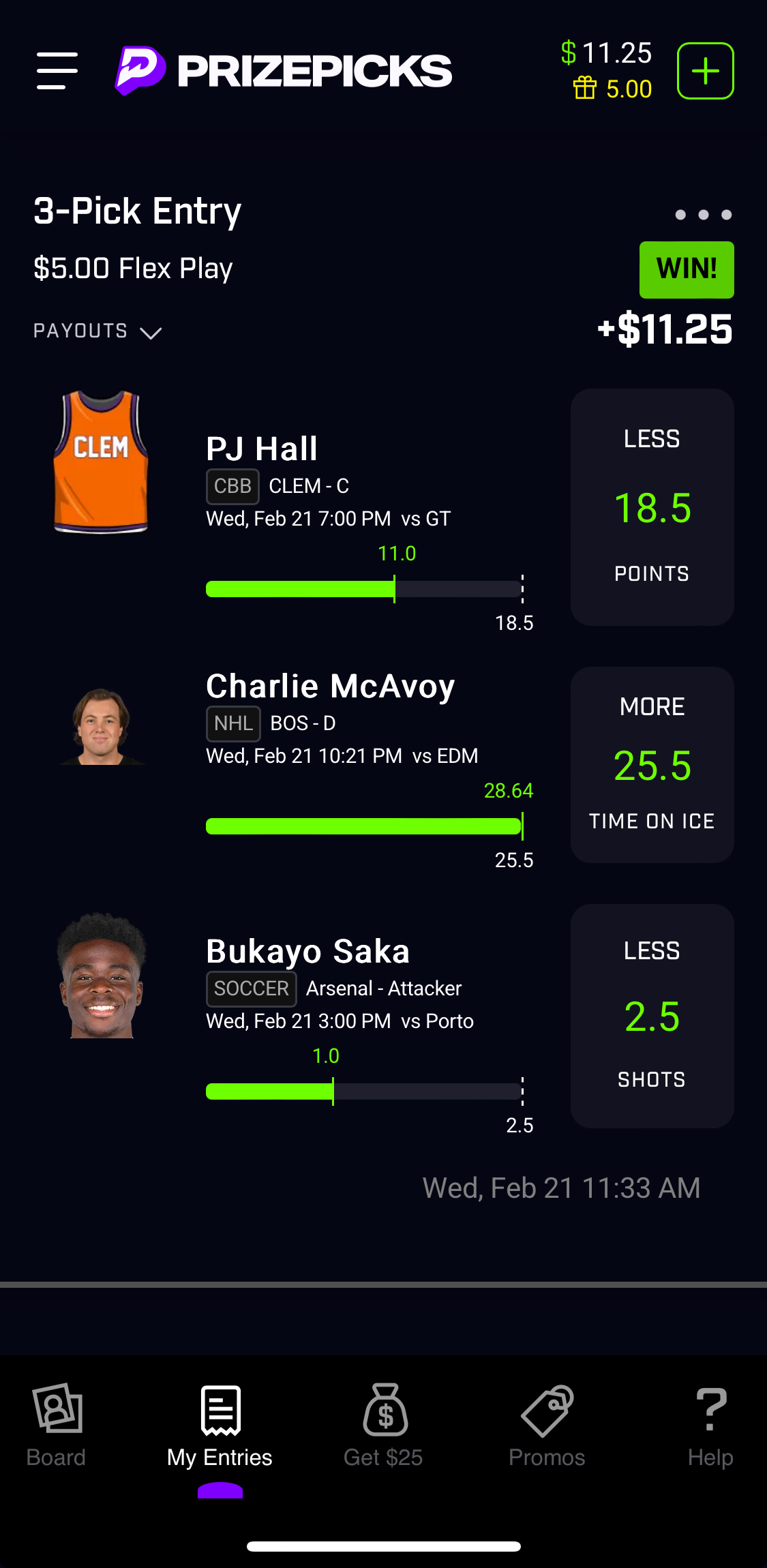
Daily Fantasy wagers against the house allow users to place money against the statistical predictions made by the service. (Screenshot from PrizePicks/Carolina News and Reporter)
Video poker and the lottery were wedge issues in the 1998 S.C. Gubernatorial election. Democrat Jim Hodges’ support for the lottery and opposition to video poker were major contributing factors to his victory over the Republican incumbent, David Beasley. (Video courtesy of CSPAN/Carolina News and Reporter)

